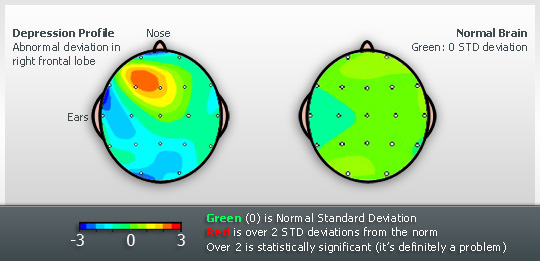Depression natural ways to treat depression natural help for depression
Is Neurofeedback an Alternative to Medication for Depression?
Depression robs sufferers of all joys of life and leaves them a shell of what they once were. In addition to the despair, loneliness, and overwhelming sadness, it can even be fatal as some people can become so desperate to end their pain they attempt suicide to escape the prison of depression.
Traditionally, depression has been treated with therapy and medication, both of which have limitations, and medications can have significant side effects.
Even with medication, countless depression sufferers continue to struggle. Medications don’t teach the brain how to get out of the unhealthy brain pattern of depression. While drugs can serve some positive benefit, there are numerous problems with these medications, including:
- Uncomfortable side effects
- Reliance on the medication making it difficult to stop taking it and manage mood on one’s own.
- Medication tolerance can develop, necessitating a dosage increase or medication change which may produce new side effects.
- If medications are stopped, symptoms often return.
Neurofeedback can help restore healthier brain patterns and eliminate depression by teaching the brain to get “unstuck” and better modulate itself. Brain training can be an effective method of treating depression and, for people taking medication when they start neurofeedback, reducing or stopping their prescribed drugs needs to be done with their doctor’s supervision as their brain becomes more stable over time. natural ways to treat depression natural help for depression
BRAIN TRAINING = MOOD REGULATION
Neurofeedback Trains the Brain to Regulate Mood.
After brain training with neurofeedback, people with depression report they are better able to stabilize their moods and that their motivation improves.
Neurofeedback training works on the root of the problem, altering the brain patterns affiliated with depression. Neurofeedback can bring lasting brain changes, is non-invasive, and produces no undesirable side effects.

Feeling down or depressed from time to time happens.…
How Does Neurofeedback Help Treat Depression?
Feeling down or depressed from time to time happens to most people, but usually passes, and the person can improve his or her mood naturally. However, some people cannot break out of a depressed state over an extended period of time. In those cases, a person is considered to have clinical depression, a psychological diagnosis.
In reality, there is much research demonstrating that depression is neurological, not psychological. Certain brain patterns are linked to depression, as illustrated by the EEG brain mapbelow.

Neurofeedback actually retrains the dysfunctional brain patterns associated with depression, making it a powerful treatment tool. With neurofeedback training, the brain practices healthier patterns of mood regulation under the supervision of a qualified neurofeedback clinician. Sessions can range from once a week to several times a week and average 30 minutes each.
Those with depression often notice improvement after only a few sessions, but for the brain to fully learn to make healthier patterns consistently, a number of brain training sessions are required. With sufficient practice, the brain learns to make these healthy patterns on its own and regulate mood independently.
Neurofeedback can help depression sufferers get their lives back. Your brain changes when you are depressed, and neurofeedback can help it relearn healthier patterns, giving those who suffer from depression a way out of the prison of their minds.

- Home
- DEPRESSION / ANXIETY
- PTSD / TRAUMA
- ADDICTION
- LIFESTYLES
- TRAINING & CERTIFICATIONS
- HYPNOSIS REFERRAL FORM
- HYPNOSIS
- FEARS Vs. PHOBIAS
- INSOMNIA
- WEIGHTLOSS
- SMOKING CESSATION
- NLP NEUROLINGUISTIC PRO
- HEALING SOUND FREQUENCIES
- HYPNOTIC REGRESSION
- BREATHWORK
- HYPNODONTICS
- LANGUAGE STUDY HYPNOSIS
- WORKSHOPS
- DOWNLOAD HYPNOSIS AUDIO
- NEUROFEEDBACK
- What is Biofeedback
- Contact Us Now
- Gottman Success Stories
- TELEHEALTH
- PROUD AMERICAN PROGRAM
- MERCHANDISE
- Appointment Booking
This website uses cookies.
We use cookies to analyze website traffic and optimize your website experience. By accepting our use of cookies, your data will be aggregated with all other user data.
